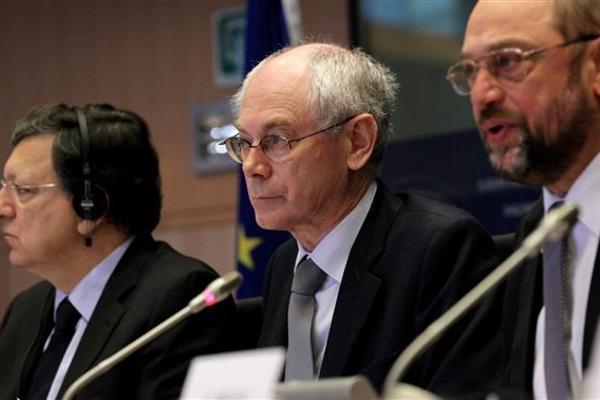Britain's Cameron could make EU unravel: Van Rompuy
LONDON - Agence France-Presse


European Commission President Jose Manuel Barroso, President of the European Council Herman Van Rompuy, and European Parliament President, German Martin Schulz attend to a Conference of Presidents meeting in Brussels, Belgium 17 December 2012. The presidents of EU institutions present the out come of the last week's EU summit. EPA/OLIVIER HOSLET
British Prime Minister David Cameron's attempts to win back powers from the European Union could cause the 27-nation bloc to fall apart, its president Herman Van Rompuy said in an interview Thursday.Cameron, who is under pressure from "eurosceptics" in his Conservative party, said last month that he still supports British membership of the EU but wants a "new settlement" that involves winning opt-outs on key issues.
"If every member state were able to cherry-pick those parts of existing policies that they most like, and opt out of those that they least like, the union in general, and the single market in particular, would soon unravel," Van Rompuy told The Guardian newspaper.
"All member states can, and do, have particular requests and needs that are always taken into consideration as part of our deliberations," he added.
"I do not expect any member state to seek to undermine the fundamentals of our co-operative system in Europe." Van Rompuy said changes to EU treaties under Cameron's proposed opt-outs would involve a "lengthy and cumbersome procedure" needing the unanimous agreement of all states in the bloc.
Polls increasingly show Britons favour a full exit from the EU, which is widely perceived in Britain as meddling in domestic affairs and wasting money during a time of austerity at home.
But Cameron has so far avoided offering a clear "in-out" referendum despite pressure for clarity from his party. A keynote speech he was expected to deliver on the issue this month has been pushed back until early 2013.
Van Rompuy told the Guardian that a British departure would "see a friend walk off into the desert".
"Britain's contribution is greater, I think, than it sometimes realises itself," he said.
